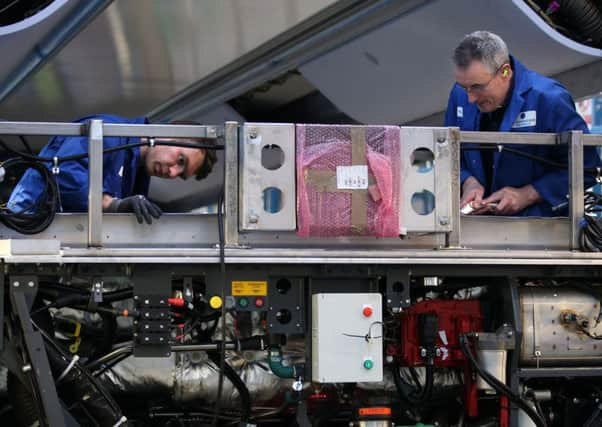Weak sterling fails to halt manufacturing slowdown


The latest Markit/Cips manufacturing purchasing managers’ index (PMI) showed that output showed a reading of 54.6 in February, down from 55.7 in January and shy of City economists’ expectations of 55.6. A reading above 50 indicates growth.
Rob Dobson, senior economist at IHS Markit, said output from manufacturing, which accounts for 12 per cent of the economy, remained comfortably above the long-run average of 51.6, but growth may ease in the months ahead.
Advertisement
Hide AdAdvertisement
Hide Ad“The survey is signalling quarterly manufacturing output growth close to the 1.5 per cent mark so far in the opening quarter which, if achieved, would be one of the best performances over the past seven years,” Dobson said.
“[But] the big question remains as to whether robust growth can be sustained or whether it will continue to wane in the coming months. The slowdown in new order growth and a drop in backlogs of work suggest output growth may slow further.”
Despite falling further from December’s two-and-a-half-year high, production and new orders were robust in January, with the Brexit-hit pound stoking overseas demand.
The report showed that input costs – raw materials etc – had eased back last month from January’s record highs, but were still close to the highest levels on record.
Sterling’s 18 per cent slump against the US dollar and 10 per cent fall versus the euro since last June’s Brexit vote has made the cost of imported raw materials more expensive for UK manufacturers.
The pound fell a further 0.7 per cent against the dollar yesterday on speculation that US interest rates will rise later this month and strengthen the dollar further, the hit to sterling exacerbated by the worse than expected manufacturing figures.
Howard Archer, chief UK economist at IHS Markit, said domestic orders tailed off in February, pointing to a bumpy road ahead for manufacturers.
Advertisement
Hide AdAdvertisement
Hide Ad“Rising prices for capital goods and big-ticket consumer durable goods, diminishing consumer purchasing power and likely increasing business concerns and uncertainties over the economy look likely to increasingly hamper manufacturers,” he said.
“There have also been reports that consumers brought forward purchases of big-ticket items in late-2016 in anticipation of rising prices over the coming months.
“Significantly higher prices charged by manufacturers for capital goods will also likely constrain demand.”
Manufacturing exports expanded for the ninth successive month, with stronger sales from mainland Europe, America and Australia offsetting slower domestic demand. Employment numbers in the sector also expanded again.
